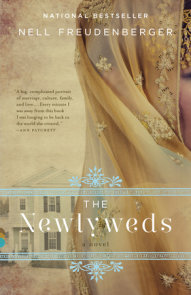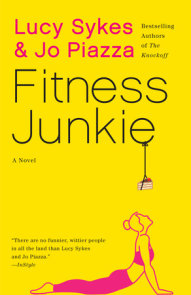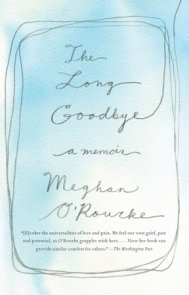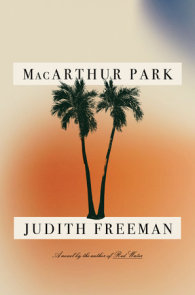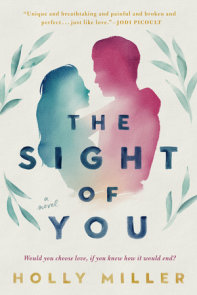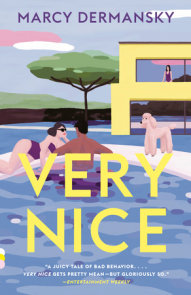READERS GUIDE
Questions and Topics for Discussion
INTRODUCTION
In her bestselling memoir Eat, Pray, Love, Elizabeth Gilbert met Felipe, a Brazilian gemstone trader, in Indonesia. As she finished her travels (and the book), their magical affair evolved into a deeper love, and the two resolved to settle together back in the United States. Both had been through bad divorces, and though they pledged fidelity to one another, they were content to live in domestic bliss unrecognized by official ceremony or legal title. Unfortunately, the Department of Homeland Security, noting Felipe’s record of border crossing for business, had other plans for them. When an airport guard held Felipe and threatened deportation, Gilbert asked what legal recourse they would have. The guard suggested a simple solution: marriage.
The idea came as a shock to the couple, but recognizing that their options were limited, they agreed to set the process in motion and apply for a visa that would enable Felipe to return to the U.S. In the meantime, they set off on a peripatetic year in Asia, traveling with limited resources and waiting for word from their immigration lawyer as their case languished in bureaucratic uncertainty. Gilbert used this time to research the concept of marriage in Western culture, as seen through the lens of historians, psychologists, sociologists, and poets, looking closely at how the institution has evolved to reflect our social needs and how it is so often intertwined with religion, politics, class, and money. In an attempt to overcome her anxieties about returning to the altar, Gilbert also interviewed natives of Laos and Vietnam, as well as her own family and friends, about their attitudes toward matrimony. All the while she and Felipe deepened their commitment to one another, putting their beachside romance to a stronger test—living out of bags in foreign countries, under the emotional duress of indeterminate exile, for months at a time.
A thoughtful examination of marriage and true partnership in contemporary society, Committed is a deeply insightful and relevant book. Illuminating little-known facts such as the partnership rate among seagulls and the mating rituals in the Roman neighborhood of Trastevere, Gilbert explores divorce, compatibility, monogamy, gay marriage, child rearing, and feminism. As in Eat, Pray, Love, her wit, curiosity, and human compassion elevate a personal journey to a compelling and important narrative. Committed delves into one of our strongest cultural institutions as its author finds her own place within it.
ABOUT ELIZABETH GILBERT
Elizabeth Gilbert is an award-winning writer of both fiction and nonfiction. Her short story collection, Pilgrims, was a finalist for the PEN/Hemingway award, and her novel, Stern Men, was a New York Times Notable Book. Her 2002 book, The Last American Man, was a finalist for the National Book Award and the National Book Critics Circle Award. She is best known for her 2006 memoir, Eat, Pray, Love, which has been published in more than thirty languages.
A CONVERSATION WITH ELIZABETH GILBERT
Q. In some sense, the book’s conclusion—that you would find a way to make peace with marriage—was foregone, considering the circumstances you and Felipe were facing. But what twists and turns surprised you along the way?
While it’s true that this wasn’t a book in which I was deciding whether to get married or not (since that decision was made immediately, under duress, as soon as Felipe was detained by Homeland Security at the Dallas–Fort Worth Airport), what I was seeking, instead, was a way to find comfort within that forced circumstance. I was searching for a means of reconciling myself to the whole notion of matrimony, which I imagined would be a difficult task given my instinctive aversion to that hidebound old institution. During all my research and contemplation, though, I gradually discovered that marriage—once you examine it closely—is not necessarily just a hidebound old institution but also a complex, fascinating, flexible, and ever-evolving bundle of social ideas that shift and transform with every new generation. I came away with a curious and unexpected sense of respect for marriage at an almost Darwinian level—amazed that this curious human habit still stubbornly endures, even after all these centuries of change and modification.
Q. Your subject matter—the significance and endurance of marriage—is widely relevant to readers yet deeply personal. How did you find a narrative balance that would enlighten and engage readers while allowing room for self-exploration?
If there’s anything I learned from writing Eat, Pray, Love it is this: I am a very representative twenty-first-century American woman. The questions, fears, and longings that I face in life are not that different from the questions, fears, and longings of thousands of other people just like me. In that regard, I feel comfortable using myself as a stand-in for other people’s questions, allowing the character of “Liz” to become an investigating avatar who vocalizes and explores what everybody else is secretly asking themselves. The main difference between me and everybody else, though, is that because of my position as a writer I actually have the time, the resources, and the energy to spend three years doing absolutely nothing but examining one question from every possible viewpoint and then distilling my conclusions down into something like an extensive term paper that I can then share with others. Of course, nobody wants to read anything that sounds like a term paper, so I’ve chosen to weave my own tale—my own love story—through all the research and contemplation in order to keep my readers engaged in something that will feel more immediate and personal.
Q. As a sequel of sorts, Committed follows up the fairytale romance of Eat, Pray, Love with some stark realities, including the bureaucratic proceedings of the Department of Homeland Security. Was it difficult, as an author, to switch gears and take on this less romantic subject matter?
I like to say that the difference in tone between Eat, Pray, Love and Committed is the difference in tone between romance and marriage. Eat, Pray, Love is, in every way, a romantic story, full of escape and longing and sensual exploration and even the shimmering thrill of emotional imbalance. Such a tone was appropriate to that year of self-exploration because that’s what it was like. I was overcome during my Eat, Pray, Love journey by a sense of daring, of soaring possibility, and such expansion was exactly what I needed, in order to reinvigorate my life after a period of loss and sorrow. But I daresay that marriage demands of us a slightly more pragmatic temperament. And the events that precipitated Committed were so especially serious (you could say that Felipe’s and my romance ended the minute the men in the Homeland Security uniforms handcuffed him and led him away) that a sense of sobriety and levelheaded focus was really called for in this situation, in order to handle things wisely. That same sense of sobriety and focus, I think, informs the overall tone of Committed. It wasn’t painful or limiting to write the book in such a manner; it just felt accurate and appropriate to both the subject and the situation. Anything else would have felt like a lark, which would not have benefitted anyone, least of all me.
Q. The notion of “tiny acts of household tolerance” is a beautiful and spiritual way of thinking about partnership. In your own life, how does your spirituality intersect with marriage?
Everything I have ever learned about life—spiritual and otherwise—helps me to do better within this marriage than I have in past relationships. I think this is part of the reason that marriage is so ill-advised for young people. With rare exception, most twenty-two-year-olds simply haven’t been sanded down or humbled enough by life’s experiences to have acquired the wisdom and perspective that make long-term human intimacy possible. But yes, certainly the lessons of a sincere spiritual quest have been awfully helpful in negotiating the challenges of running a household—with the most important lesson of all being that I am, at the end of every day, responsible for my own state of being. I doubt that there is a more important tool of cheerful companionship than that truth.
Q. Having gone through a painful divorce and remarriage, do you find you actually have more reverence for the institution of marriage? Beyond the particulars of your relationship, how is the experience of marriage different for you now?
I once asked a friend of mine, whom I’d recently witnessed frolicking happily with her four-year-old daughter, “Do you love being a mom?” My friend replied, “I don’t intrinsically love motherhood as a concept, but I do love being Lucy’s mom.” I feel the same way about marriage. Do I love and adore matrimony, as an institution? Not necessarily. But I love and adore Felipe. I believe in him. And even after almost six years together, I simply enjoy the hours that we are able to spend together, and (as the events of Committed show), I will do anything to defend our privacy, our union, our contract. I have a much better husband now, in my second marriage, than the husband I got in my first marriage—but it’s also worth noting that I am also a far better wife to Felipe than I was to my first husband. It’s rather astonishing, as it turns out, what a difference it can make to get married when one is middle-aged, accommodating, and calm, rather than young, self-absorbed, and reckless.
Q. The traveling in exile across Southeast Asia you describe in Committed is very different from the open-ended journey of Eat, Pray, Love. For one thing, you were emotionally attached when you set out to write this book. How did that change your experience of traveling?
There’s a big difference between traveling because you want to and traveling because you are not allowed to go home again. Felipe and I had many wonderful experiences when we were living out our period of immigration exile, but we could never forget for long that we were, in fact, forbidden to return home, and we had no idea when that period of exile would lift. That knowledge alone brought a keen sense of homesickness to me that I had never experienced before as a traveler, and it seems to have colored forever my feelings about travel. (I will never again cross a border carelessly, for one thing.) It’s also true that Felipe and I were in the early stages of a very sweet period of experimental domesticity when circumstances wrenched us out of our home, so that was painful, but also transformative. When we finally did return to America safely to settle down, we both felt a compulsion to really burrow in—which is exactly what we’ve done. For the first time in my life—living in a small town, with a lovely husband, in an old house with a big garden and several pets—I feel absolutely rooted in a way I have never experienced before and never would have imagined even desiring. But it is what we want—at least for now—and so we’re relishing that stability.
Q. When describing your most heated moment of conflict with Felipe in Laos, you expertly capture the nuances of strained communication in an exchange that probably happened very quickly in real life. Did knowing you were writing this book help you maintain a perspective in the moment that you might not have had otherwise?
To be honest, I had no sense that I would put that scene in the book, as it was unfolding. It certainly didn’t feel like anything worth sharing. (Who would want to invite the world to judge the private Whose Afraid of Virginia Woolf spat of an unhappy couple?) But my sister, when reading the first draft of Committed, objected that I hadn’t shown the very dark and very real underside of intimacy—namely, the way that two people who love each other dearly can swiftly turn on each other when circumstances press against them too hard. I realized immediately that my sister was absolutely right: I hadn’t shown that darkness at all (which means I hadn’t told the whole story of marriage). Vividly remembering every word of that fight on the bus, I dredged it all up again and, frowning the whole time, recorded its ugly entirety for posterity.
Q. You write of finding your “own little corner within matrimony’s long and curious history.” What does that corner look like to you, and how does it help you come to terms with the idea of becoming a wife again?
I choose to align myself with all the rebellious and stubborn people over time who have also endured all manner of bureaucratic trouble in order to have what they wanted—a bit of privacy in which to practice intimacy. To me, my little corner is full of willful people, their arms crossed and chins raised, drawing protective circles around their beloveds, insisting on defending their most intimate personal choices against any possible external interference. It feels good to be there. It feels like home.
Q. Which myths about marriage, either personal or cultural, were most difficult for you to dispel in writing and researching this book?
I don’t think I went into this project overburdened with dewy-eyed romantic myths about marriage (my divorce had pretty much wiped those out years ago), but I did carry an instinctive prejudice that marriage is an artificial construct of society, invented as a tool of repression by states and religions. The story is far more complicated than that. In fact, it wasn’t states or religions that invented the notion of marriage but individuals and families, who wanted to create some sort of special protective bond that would be recognized and respected by everyone in the community. What shocked and amazed me was to discover how vehemently repressive governments and institutions (Soviet Russia, for instance, or the early Christian church) battled against marriage, trying in the most idealistic phases of their evolution to break down the natural bonds of love and family in order to exert more control over the populace. Seen in such light, marriage starts to look appealingly subversive to me—but I lean that way, and so of course I would find that exciting.
Q. In some sense writing a book like Committed is the literary equivalent of Catholic premarital counseling. How has the experience informed your relationship or your roles as a couple going forward?
The writing of this book has been enormously helpful to me—to the point that I can’t imagine how I could ever have considered entering the estate of marriage without having given it this much serious thought, study, and contemplation. There is information that I uncovered in my research that has completely informed my life with Felipe on a daily basis—from the dangers of modern romantic over-expectation, to the wise advice of my mother and grandmother, to the compelling facts found within the Rutgers marriage survey, to some of the more subtle tactics for interpersonal conflict negotiation. All of it helps, all of it has been used, all of it uplifts or reassures. I have never been a fan of the genre of writing called self-help, but in this case, I must say that Committed has been exactly that for me: a book created in order to help myself. I can only hope, now that it is out there in the world, that it might also be of use to others.
DISCUSSION QUESTIONS









